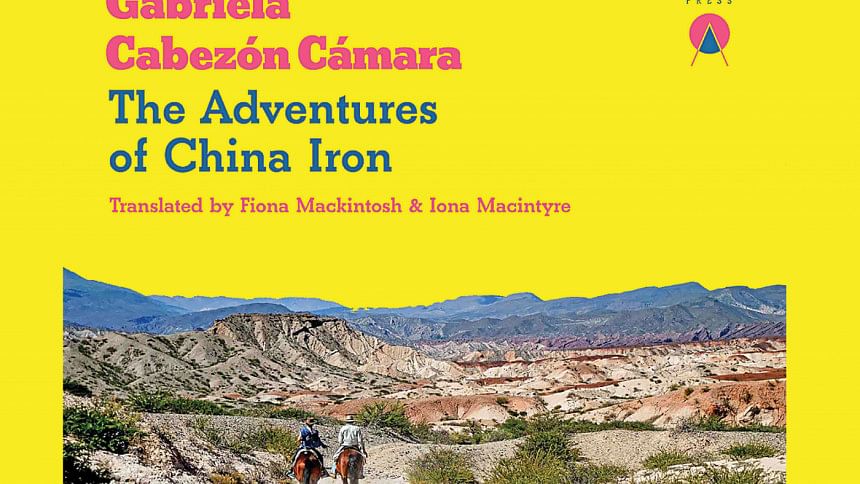Reclaiming Historical Spaces through Fiction

The Adventures of China Iron by Gabriela Cabezón Cámara (Charco Press, 2019) begins in the poor encampments of a village in 19th century Argentina, with the protagonist marvelling at the hope and light she finds in the sight of a puppy playing in some dirt.
The 14-year-old narrator does not have a name; she answers to "La China"—pronounced Chee-na—a Quechua word that translates to "someone's woman." As an orphan China was raised by abusive parents in the slums. They eventually sold her off to one Martin Fierro with whom she bore two children. After her husband is (forcefully) conscripted by the Argentinian Army, China is left alone to navigate a life for herself. She discovers joy and freedom in this solitude, an experience that others around her perceive as misfortune.
As she settles into the novelty of her freedom, China meets Elizabeth, a Scottish woman left alone in their village because her husband, too, was mistakenly picked up by the Army. Liz shares that she will be journeying in search of him far into the frontier and indigenous territory. China sets off with her on impulse, taking along the puppy whom she has lovingly named Estreya (translating to "The Star"). It is Liz who first gives La China the dignity of a name, La China Josefina Fierro: China Josephine Iron. And together they set off across the Argentinian pampas, juxtaposed against a nation being adopted into the British colonial project.
China narrates her story in three parts and one can sense her voice mature as she learns about herself and the world. Her narration is conversational, with a childlike sense of wonder both for the beautiful skies and grasslands, as well as the unforgiving landscapes "pearled with bones" across the pampas. "No longer flat, it heaved with grain, tents, Indians on the move, white women escaping from captivity, horses swimming with their gaucho riders still astride, while all around the dorado fish darted like lightning into the depths, into the middle of the bursting river. It didn't seem real to witness such a thing, to see the whole world being dragged along, slowly spiralling, muddy and dizzying, a hundred leagues away to the sea," she writes.
First published in Spanish in 2017, the book was translated into English by Fiona Mackintosh and Iona Macintyre in 2019, shortlisted for the International Man Booker Prize 2020. This translation does the characters and their voices justice, weaving in local terms to stay true to the original and providing sufficient guidance for a reader unfamiliar with Spanish.
China's voice—and Camara's skill as a writer—are strongest when speaking of brutal and systemic injustices through ordinary events of their excursion. An example of this is how the British Empire's nation building ideologies overshadow Liz's budding relation with her. Liz speaks of the wonders which Britain has discovered: tea illustrates India, whisky, her native land; French craftsmanship in skill petticoats and gowns; Chinese paddy field and its curly roofed pagodas. Liz populates China's perspective with her own, in which the British Empire is at the top (quite literally, in her notion of the world map), controlling and navigating the fates of far off countries. While China is enraptured in her evolving feelings for Liz, she questions, albeit naively, the notion that the glorious Argentinian pampas should form the dull bottom half of that world.
Through this story, Cámara upends the epic tales of Argentinian resistance, which were predominantly narrated through the male gaze of "macho men corralling with the natives and cultivating the vast grasslands." China's story is placed on top of José Hernández's 1872 epic poem "El Gaucho Martín Fierro" (The Gaucho Martin Iron), which carries heavy national significance in Argentina, having established gauchos—skilled brave horsemen who roamed the peripheries of Argentinian and Uruguayan land and law—as a symbol for the fight against corruption and pro-European sympathies.
But Cámara does more than draw inspiration. She reinvents the classic tale. From the margins of El Gaucho's single-voiced narrative, she brings to centre stage the wives left behind and the indigenous communities. This shifts not only the centre of Hernandez's epic poem, but also the narratives of political struggle, colonial agenda, and nationalist sentiments created in and cemented into literature.
In Hernandez's poem, Fierro's wife and her struggles are condensed into the following verse: "When she hadn't a single copper left, And of husband and sons she was bereft/ If she wasn't to stay and starve to death, What else could the poor thing do?"
Cámara shows "the possibilities Fierro's 'poor wife'" navigates for herself amidst the trauma and turbulence of national and personal power struggles. If one has read El Gaucho, The Adventures of China Iron will reveal the blind spots in the epic poem. But China's tale stands on its own merits as a feminist queer romance, a coming-of-age story that critiques an enduring patriarchal, capitalist world order. There are no boundaries between imperialist agenda and national resistance inside China and Liz's travelling wagon. Despite its short length, the book is an immersive lesson that the personal and political are forever in flux in all our realities. In fiction it manages to become what we expect our realities to be—honest and inclusive.
Ishrat Jahan is an early stage researcher who writes in her free time. Reach her at [email protected].

 For all latest news, follow The Daily Star's Google News channel.
For all latest news, follow The Daily Star's Google News channel. 



Comments